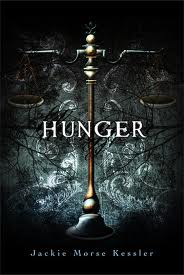 “Lisabeth Lewis didn’t mean to become Famine. She had a love affair with food, and she’d never liked horses (never mind the time she asked for a pony when she was eight; that was just a girl thing). If she’d been asked which Horseman of the Apocalypse she would most likely be, she would have probably replied, “War.” And if you’d heard her and her boyfriend, James, fighting, you would have agreed. Lisa wasn’t a Famine person, despite the eating disorder.”
“Lisabeth Lewis didn’t mean to become Famine. She had a love affair with food, and she’d never liked horses (never mind the time she asked for a pony when she was eight; that was just a girl thing). If she’d been asked which Horseman of the Apocalypse she would most likely be, she would have probably replied, “War.” And if you’d heard her and her boyfriend, James, fighting, you would have agreed. Lisa wasn’t a Famine person, despite the eating disorder.”
This is the story of how an anorexic seventeen-year-old became one of the Four Horsemen of the Apocalypse, along with Death (bearing a strong resemblance to Kurt Cobain) and their companions Pestilence and War. One day-actually, the same day of her attempted suicide- the delivery man shows up, bearing a set of scales. She accepts the scales, and finds herself newly employed as Famine, complete with menacing horse waiting for her in the garden. (Ok, well, he’s not so menacing-he prefers eating pralines to shedding blood, but Lisa’s not your typical Famine, either).
Lisa’s new job takes her far away from her troubles at home: a concerned boyfriend, a self-destructive friend, her constant struggle with food. As Famine, she sees firsthand the devastation of hunger, and learns about her terrifying new powers. Famine, it seems, not only has the power to kill and destroy, but also heal and nourish. Is it possible that Lisa’s job as Famine will give her the strength to recover from her eating disorder?
Friends, I’ve read a lot of books about eating disorders. Most of them follow the same girl gets sick-girl denies sickness-girl forced into treatment-girl gets better arc; it’s not necessarily a bad plot, but the focus on disordered eating behaviors and calorie counts and weights can be triggering and counterproductive. This is absolutely not one of those books, though-it is definitely shortlisted for Shanna’s “Great Books about Eating Disorders that Won’t Make You Nuts with Incessant Calorie Counts” Prize. Kessler infuses the novel with gallows humor, witty dialogue, and great twists. What I loved most was the underlying message, delivered in the least preachy way possible: Lisa finds that she must care for herself so that she can care for others. This short, clever novel is one that will appeal to reluctant readers, fans of fantasy, and anyone who’s struggled with similar issues.
Happy reading!
Author’s website: http://www.jackiemorsekessler.com/
Kessler, Jackie Morse. Hunger. Houghton Mifflin: New York, 2010. 177 pp. Ages 15 and up.
If you liked this book, she’s got two more in the Riders of the Apocalypse series:
and another one coming soon!

